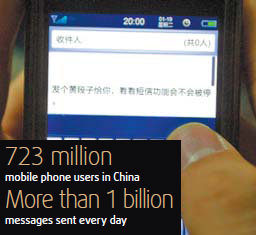Society
Filter 'no threat' to users' privacy
By Peng Yining (China Daily)
Updated: 2010-01-23 08:17
 |
Large Medium Small |
China's largest mobile operator has pledged to protect its users' privacy amid concern over the filtering of text messages for illegal or pornographic content.
Li Kang, deputy director of customer services for China Mobile, insisted consumers are not affected by the filter system and said the move is part of wider efforts to clampdown on "unhealthy" mobile Web content.

"The freedom and privacy of individual users enjoys legal protection," he said on Friday. "China Mobile will do its best to protect consumers' rights and interests strictly in line with the relevant laws and regulations."
His comments were aimed at easing fears over a warning that the company would suspend services to any subscriber found sending illegal content via text message.
China Mobile branches in Beijing and Shanghai, as well as in Guangdong province, announced days ago that suspensions would be imposed if its operations system detected a message with a large amount of illegal content, or if other users complained.
The move provoked debate among China's 700 million cell phone users, some of whom claimed the filtering policy violates users' privacy.
"The news scared me," said Cui Fei, a 24-year-old China Mobile subscriber in Beijing. "If they can find out and ban anyone who sends porn, then every message is under supervision. It's like someone's peeping on my private message box. I feel uncomfortable with that."
| ||||
The post has been viewed by 546,000 netizens and received 11,000 comments.
Many people have also argued that an anti-porn filter system would not work.
"It's hard to define porn, especially when it comes to interpersonal communication. It could be a joke. How can they disable my mobile function for a joke?" said Liu Xin, an engineer from Heilongjiang province.
Yu Lingyun, a law professor at Tsinghua University in Beijing, agreed and told China Daily on Friday: "Sexual jokes between friends and couples should not be banned as porn."
Filtering illegal information is necessary, he said, but a system should also be set up "in case any legal content and communication is incorrectly recognized as porn".
Li Mofang, former chief engineer of China Mobile, supported the company's assurance that the filter system does not affect subscribers.
"Only abnormal sending behavior, such as the distribution of a large number of short massages in a short time, will be the target of monitoring and filtering," she said. "The operator has an automatic monitoring system which filters suspicious massages using a set of key words.
"Mobile phone users in China send more than 1 billion short messages every day. There's no way to monitor all of them," Li Mofang said.
The move by China Mobile was simply part of a nationwide crackdown on porn by telecom networks and the government, she said.
China Mobile receives an average of more than 1 million complaints about unsolicited messages every month, with each of the users in Beijing, Shanghai and Guangdong receiving about 10 unsolicited messages a day, Li Kang said.











